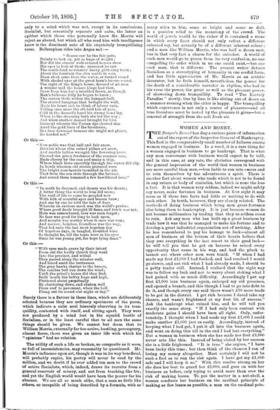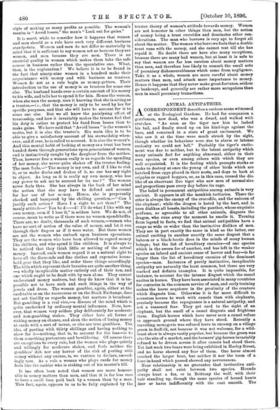WOMEN AND MONEY.
THE Draper's Record has dug a curious piece of information out of the report of the Inspector-General of Bankruptcy. This fact is the comparatively small number of failures among women engaged in business. In a word, it is a rare thing for a woman engaged in business to go bankrupt. That is what any man conversant with business would expect to be told, and in this case, at any rate, the statistics correspond with the general impression of the world that women in business are more careful than men,—less liable to run into excess and to ruin themselves by too adventurous a spirit. There is another fact about women who trade which is not to be found in any return or body of statistics, but which is none the less a fact. It is that women very seldom, indeed we might safely say never, make fortunes in business. At first sight it may seem as if these two facts had little or nothing to do with each other. In truth, however, they are closely related. The methods of doing business which bring men great fortunes also bring them to bankruptcy. It is just because women do not become millionaires by trading that they so seldom come to ruin. Ask any man who has built up a great business by trade how it was that he managed to make his fortune and to develop a great industrial organisation out of nothing. After he has remembered to pay his homage to luck—almost all men of business at the bottom of their hearts believe that they owe everything in the last resort to their good luck— he will tell you that he got on because he seized every opportunity that came in his way, and had the pluck to launch out where other men were timid. " If when I had made my first £1,000 I had funked, and had resolved I would go slower, and not risk what I had already made, I should be a petty trader still. Instead, I realised that the right way was to follow my luck and not to worry about risking what I bad gained with so much difficulty. Accordingly I put my first £1,000 into business again, enlarged my old premises, and opened a branch, and this though I had to go into debt to do it, and though every one said there wasn't £10 more trade to be got in the district. I got rich because I dared take my chance, and wasn't frightened at my first bit of success." Ask the bankrupt what ruined him, and he will tell you exactly the same story. " If I had only been content with moderate gains I should have been all right. Only, unfor- tunately, I thought when I had made my first £1,000 I could make another £1,000 just as easily. Accordingly, instead of keeping what I had got, I put it all into the business again, and went on doing this till in the end I had lost everything." But a woman in business when she has made her first £1,000 never acts like this. Instead of being elated by her success she is a little frightened. " It is true," she argues, " I have been lucky this time ; but then think of the chances I ran of losing my money altogether. Most certainly I will nob be such a fool as to run the risk again. I have got my £1,000 safe and I will keep it so." With this resolve strong on her she does her best to guard her £1,000, and goes on with her business as before, only trying to avoid more than ever the risk of making losses. To put the matter in a nut-shell, a woman conducts her business on the cardinal principle of making as few losses as possible, a man on the cardinal prin-
ciple of making as many profits as possible. The woman's maxim is " Avoid losses," the man's " Look out for gains."
It is worth while to consider how it happens that women and men should as a rule have such very different business standpoints. Women and men do not differ so materially in mind that it is sufficient to say women act so because they are women, and men because they are men. There is no essential quality in women which makes them take the safe course in business rather than the speculative one. What, then, is the explanation ? We believe it is to be found in the fact that ninety-nine women in a hundred make their acquaintance with money and with business as trustees.
Women do not as a rule begin as money-getters. Their introduction to the use of money is as trustees for some one else. The husband hands over a certain amount of his money to his wife, and tells her to spend it for him. Hence the woman, when she uses the money, uses it knowing that she is acting as a trustee,—i.e., that the money is only to be used by her for specific purposes, and that she will have to account for it to some one else. But we all know the paralysing effect of trusteeship, and how it invariably makes the trustee feel that his duty is rather to protect his fund from losses than to make gains. We have said that "Avoid losses " is the woman's
motto, but it is also the trustee's. His main idea is to be able to give a satisfactory account of his stewardship when- ever, and if ever, he is called to account. It is also the woman's. And this mental habit of looking at money as a trust has been handed down through generations upon generations of women, and is instinctively caught by the daughter from the mother. Thus, however free a woman really is as regards the spending of her money, she never quite shakes off the trustee feeling. The man feels,—" The money is my own, and if I like to risk it, or to make ducks and drakes of it, no one has any right to object. As long as it is really my own money, who has any power to ask me to account for its use ? " The woman never feels thus. She has always in the back of her mind the notion that she may have to defend and account for her use of her money. Hence, she is perpetually checked and hampered by the chilling question,—" Can I justify such action P Have I a right to act thus ? " The manly attitude—" You be d—d ! I'll do what I like with my own money, even if I lose it," is seldom hers. We do not, of course, mean to write as if there were no women spendthrifts. There are, no doubt, thousands of such women, women who have no sort of notion of the value of money, and let it run through their fingers as if it were water. But these women are not the women who embark upon business operations. They are the women who have been allowed to regard money like children, and who spend it like children. It is always to be noticed that they think little or nothing of the actual money. Instead, such women regard it as a natural right to have all the diamonds and fine clothes and expensive house- hold gear that they like, and order these things accordingly. The bills which represent their luxuries are quite another thing, —a wholly inexplicable matter entirely out of their ken, and one which ought to be dealt with by men alone. They cannot understand money matters, but they do know that it is im- possible not to have such and such things in the way of jewels and dress. The woman gambler, again, either at the card-table or on the racecourse or on the Stock Exchange, does not act timidly as regards money, but scatters it broadcast. But gambling is a real vice,—a disease of the mind which is quite unchecked by ordinary mental influences. Note, how- ever, that women very seldom play deliberately for moderate and non-gambling stakes. They either hate all forms of risking money on chance, and shun the notion of losing money at cards with a sort of terror, or else are true gamblers. The idea of parting with thirty shillings and having nothing to show for it—nothing, that is, to account for the loss—is to them something portentous and bewildering. Of course there are exceptions to every rule, but the woman who plays quietly and willingly for moderate stakes, and feels neither the gamblers' itch nor any horror of the risk of parting with money without any excuse, is, we venture to declare, exceed- ingly rare. As a rule a woman who plays cards for money feels like the cashier who is staking out of his master's till.
It has often been noted that women are more honour- able in money matters than men, and that it is far less rare to have a small loan paid back by a woman than by a man. This fact, again, appears to us to be fully explained by the
trustee theory of woman's attitude towards money. Women are not honester in other things than men, but the notion of money being a trust overrides and dominates other con- siderations. The man who borrows is very apt to forget all about the matter. The woman who borrows feels that a double trust runs with the money, and she cannot rest till she has repaid it. No doubt there are here also many exceptions, because there are many bad women, but at least it is safe to say that women are far less careless about money matters than men, and therefore less likely to commit the small acts of pecuniary dishonourableness which come from negligence. Take it as a whole, women are more careful about money matters than men, and attach more importance to money. Hence it happens that they never make great fortunes, seldom go bankrupt, and generally are rather more scrupulous than men in small pecuniary tranactions.



















































 Previous page
Previous page